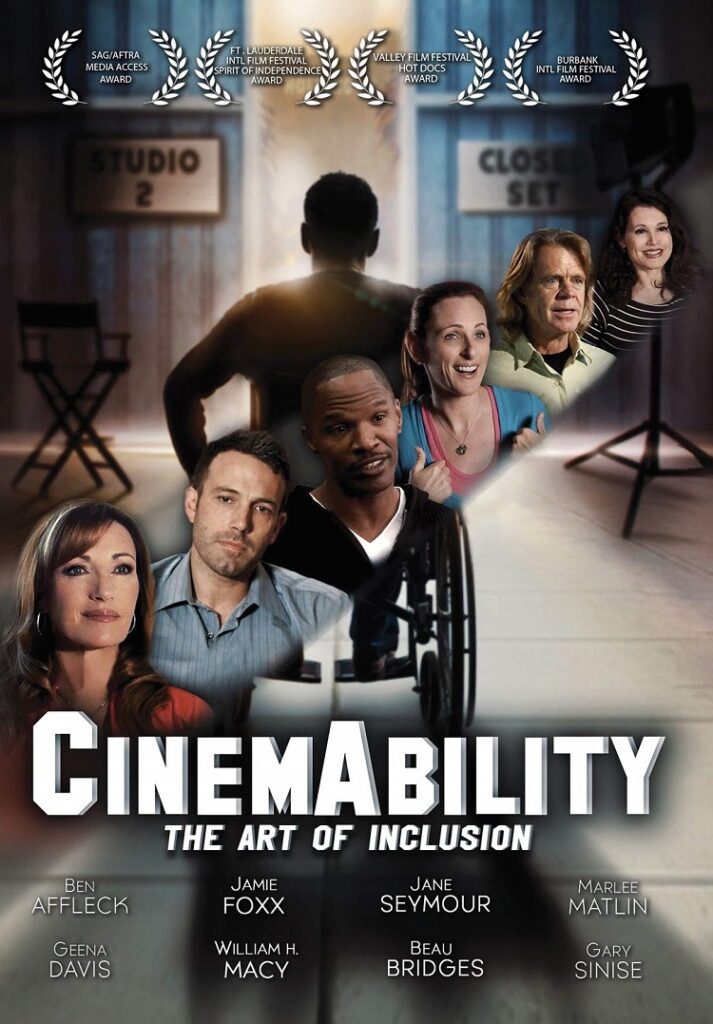
Written by Kristen Lopez
I recall a prophetic moment in my life when my mother told me, “There are not many people you can emulate who look like you.” Growing up with a disability, it was always frustrating for me to dream of a job as a writer, especially in the entertainment arena, and realize I was a minority (female) within a minority (disabled) dreaming of a job where appearance is everything. As I’ve grown older, I never once thought of analyzing movies with regards to disabilities, even though I myself am disabled. It’s a bizarre contradiction at the heart of director Jenni Gold’s brilliant documentary, CinemAbility. Gold, herself a disabled female filmmaker, brilliantly explores the history of disability within cinema, as well as interviewing people I connected with at once. This documentary isn’t just a revelation for able-bodied viewers, it’ll help any disabled person who dreams about working in Hollywood, and feels it’s a pointless endevour. I hate to use the word “inspiration,” but Gold’s documentary inspired me to keep at my dream, apparently it isn’t nearly as far-fetched as I imagined.
Gold’s documentary is many things; first and foremost, it’s an exploration and analysis about the history of disability within film. Gold employs a cadre of film critics and theorists who chart the rise of various tropes within disability in film from the angry obsessive – a male who generally is bitter about his disability and wreaks havoc – to the saintly female who would be perfect if she wasn’t disabled. The disability “craze” took off in the ’70s and ’80s with a wealth of disabled characters on television (Ironside, Facts of Life, and Life Goes On are a few examples used). All of the work connects and blends in with each other to create a fluid history lesson which never feels dry.
The biggest question lingering on the peripherals of the movie: Have we progressed in highlighting disability in cinema? Gold’s doc is rather diplomatic in its response: We have, but we’ve reached the glass ceiling. The problem is whether it’s beneficial to spotlight disability through able-bodied actors or not? Again, Gold should be applauded for remaining neutral on the issue and interviewing people both for and against disabled actors for the sake of it. Speaking of interview material, Gold has some of the best interview subjects I’ve seen in awhile. I’m not talking about Ben Affleck, Jaime Foxx, or Breaking Bad creator Vince Gilligan, but actual disabled actors working in Hollywood; actors like Robert David Hall, Daryl Mitchell, Danny Murphy, and Jim Troesh. For a girl like me who can only name a few real-life disabled actors, this was a revelation to me. The stories the actors recount about being disabled are universal, but held a special place for me having similar anecdotes. If anything, CinemAbility casts an eye towards showing disability isn’t a death sentence for working actors; the system needs to change for them.
The saddest thing is hearing various able-bodied actors, directors, and studio heads mention the continued ignorance with regards to disability in movies. Ben Affleck, William H. Macy, and Richard Donner all mention they have trouble putting disabled people in their movies because they never think of a particular character as disabled (Donner apologetically tells a story about balking at putting Danny Glover in Lethal Weapon because he never saw the character as African-American). All three men are examples that what’s on the script page is broad, but it is the directors and screenwriters who continue to pigeonhole parts. A role doesn’t say “White actor who is able-bodied,” those elements are ingrained and unspoken, and until Hollywood can ignore that mentality, diversity will remain a buzzword in Hollywood.
An important element focused on throughout is how movies impact society. I can’t think of which interview subject says it, but they mention that until the perception of disability changes, public policy cannot change and that statement is crystal clear. Whether you’re focused on women in film, race in film, or disability in film, until perceptions are changed on minorities within media, laws with regards to these groups cannot be agreed upon.
CinemAbility needs to be seen by everyone; not just industry heads or actors, but able-bodied and disabled people. It dispels a lot of the outdated notions about disability as epitomized in movies, but also has a message about treating disabled people with respect. Hollywood created the image of the sad disabled person; a person lacking ambition, dreams, romance, and yes, sex. All of these notions are dispelled through the movies Gold choose to focus on, and the interview subjects who put a human face on disability in film. We truly are all the same. Hopefully, this documentary will give a few directors the jolt to implement more disabled actors in projects. If anything, it’s given me a long list of movies to watch and review, as well as a new appreciation for disability in general. I’ve never considered analyzing movies from a disability perspective – like the directors spoken to, the idea never occurred to me – but maybe I should start! CinemAbility hopes to get a qualifying run for the Academy Awards, and I really hope it does! Gold is a promising filmmaker to watch and hopefully she’ll get the chance to direct more in the future.